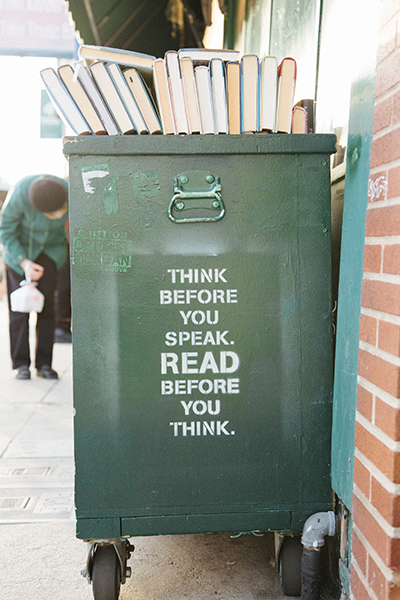How to Become a Better Writer: Inspiration from Bradbury
Learn how to become a better writer by following the advice of the legendary author Ray Bradbury.
Whether you came to Steemit with a passion for writing, or you're here for other reasons, you likely want to become a better writer. You think the better you are, the more success you'll have - more followers, more comments, more upvotes, more money, more (insert something you care about here).
Thankfully, writing is a skill. One that you can improve with some time and effort. In his Zen in the Art of Writing, Ray Bradbury (author of Fahrenheit 451 and hundreds of short stories) tells us how he learned to write better while telling his life story. He shares his downfalls and his triumphs as well as advice he thinks every writer should embrace.
I've pulled out some of his suggestions that can help you be a better writer, whether it’s to blog on Steemit, short stories, poetry or the next best-selling novel. I think you'll appreciate his wisdom - and his humor.
Include Reading in Your Muse's Diet

One of the chapters is entitled "How to Keep and Feed a Muse." The phrase "finding your muse" used to be quite common, but not so much anymore. It refers to your source of inspiration but personified - at least as Bradbury writes about it. For him, it is a singularly feminine energy that needs proper care and feeding.
The muse's diet consists of many things, but one of the most important is reading. He suggests,
Read poetry every day of your life. Poetry is good because it flexes muscles you don't use often enough. Poetry expands the senses and keeps them in prime condition.
And he adds,
In your reading, find books to improve your color sense, your sense of shape and size in the world....Poetry, essays. What about short stories, novels? Of course.
Reading is one of the most important things you can do on your journey to become a better writer. It feeds your muse and provides you the information, the experience, the raw data from which you can create your blogs, stories or poems. Trying to write without reading is like training to be a sculptor without ever seeing a statue.
Find and Release Your Voice

Bradbury begins his book with a story about his nine-year-old self. He loved Buck Rogers and his adventures. So much so that he began trying to write his own stories. He wrote for years, with some success. But even then he tells us that he wasn't a good writer,
I grew up reading and loving the traditional ghost stories of Dickens, Lovecraft, Poe, and later, Kuttner, Bloch, and Clark Ashton Smith. I tried to write stories heavily influenced by various of these writers, and succeeded in making quadruplelayered mudpies, all language and style, that would not float, and sank without a trace. I was too young to identify my problem, I was so busy imitating.
As writers, the process of finding our voice is crucial to our success. Not necessarily commercial success, but it can be. Our voice isn't just a style, but the essence of what lies behind it. It is us, on the page. It is both terrifying and electrifying when we set it free. Here is how Bradbury describes it:
I finally found it one afternoon when I was twenty-two years old. I wrote the title "The Lake" on the first page of a story that finished itself two hours later. Two hours after that I was sitting at my typewriter out on a porch in the sun, with tears running off the tip of my nose, and the hair on my neck standing up.
Why the arousal of hair and the dripping nose?
I realized I had at last written a really fine story. The first, in ten years of writing.
Wow. You can have moments like that when you write authentically. Without trying to copy, emulate, or critique as you go. It doesn't have to be a career-changing work of fiction as it was for Bradbury. It might just be the most awesome blog you've ever written on Steemit.
How do you find your voice? Write and write some more.
Write more

One of Bradbury's main suggestions is to write. A lot. No, he wants you to commit to writing every day. He recommends,
Something like this. One-thousand or two-thousand words every day for the next twenty years. At the start, you might shoot for one short story a week, fifty-two stories a year, for five years. You will have to write and put away or burn a lot of material before you are comfortable in this medium. You might as well start now and get the necessary work done. For I believe that eventually quantity will make for quality.
To prove his point he reminds us of great artists like da Vinci, Michelangelo, and Tintoretto. They practiced their art over and over before they produced the works that made them famous. In an example from more recent times, he talks how surgeons practice performing their procedures long before they ever actually do one.
If you google 'Ray Bradbury writing challenge' you'll find many who have taken up the charge to create one short story a week for at least a year. He's often quoted as having said it's impossible to write 52 bad stories in a row. But in Zen in the Art of Writing he merely points out that one should never consider some of the short stories failures. Even if they aren't good, they were part of the process of creating the ones that were great.
Never give up
Bradbury is asking a lot of aspiring writers. He wants them to spend copious amounts of time reading. And also spend their days writing and then writing some more. Is he asking too much? Do you think you can do it?
Yes, I think you can. The last words of his wisdom that I'll share explain why:
There is no failure unless one stops.
No one is perfect. And in our world, there are few of us that can spend the amount of time writing that he says is necessary. But as long as you keep writing, as much and as often as you can, his principle will still apply. Don't stop, don't ever give up.
 @ntowl , The Night Owl Writer
@ntowl , The Night Owl Writer
“We have loved the stars too fondly to be afraid of the night.” - the old astronomer
P.S. We’re looking for someone with animation experience to join our team. Compensation is 50% of post earnings. Join our Discord and provide links to previous videos that you’ve created.
We @hyperfundit.com use 90% of our upvotes to fund verified and approved projects on hyperfundit.com. Would you delegate as little as ONE SP to support the cause? 1 | 5 | 10 | 25 | 50 | 100 SP. You can take it back at any time.
Custom Amount (Replace "enterNUMBER"): https://v2.steemconnect.com/sign/delegateVestingShares?delegatee=hyperfundit.com&vesting_shares=enterNUMBER%20SP





These tips are really inspiring and I think everyone who want to become a better writer must read this blog.
Not everyone has this potential and time available 👍
Exactly right about the time @tamash. Not everyone can put this much time into writing, but I believe everyone has potential - more than they know. Not everyone can be a Bradbury but they can be the best writer they can be by following the ideas he lays out even if not to the same extent.
Well done on the words, I liked it ..
Great post from you
Thanks for sharing..
great post
Amazing post, I love Bradbury. He remembers me highschool and inspire me to write...
I'm a writer, my writing on Steemit is mainly poetry, but I'm considering writing short stories on here as well. Lately, I have an interest for Agatha Christie novels, time to visit the local library I guess.
Think • Read • Write • Repeat
A process to live by!
That sums it up really well!
That sums it up really well!
This speaks volume and your final paragraph as well. We succeed in every way. It may not be as successful as others but in our own way. We have our own goals, our own mountains to climb. It's not about the social standards or the standards of others that we should be aiming for but of our own. We know what we can do. We have the necessary tools to improve and we can do.
I'm glad this point hit home with you. So often people, writers especially, seemed to judge their success based on some arbitrary standard - how many stories published, how much money they've made, who they've worked with - whatever. But success is individual and we know when we find it even if it isn't obvious to others.
I use to beat up myself and stressed from the pressure I get because of waht people around me dictates and what is expected of me. It took a long time for me to realize that I do not have to put myself in the league of others because I have my own road to travel.
thanks for sharing. I really like the thing about reading more poetry, I'm going to start doing that
Wow! I love this post,have always loved writing but there are many times when what to write about was no where to be found,i keep on thinking and thinking but not getting the writing satisfaction the inner me wanted, @hyperfundit. com inspiration post has given me clues in making my hobby enjoyable especially as a new steemian.
This post has some of the best advice a person can receive about writing. It has helped me a lot. Especially when it comes to writing every day. Sometimes it's hard to find the will, the time, the right inspiration... But you don't have to write a story all the time. Just write whatever comes to your mind, ideas, notes, things that happened to you, things you heard. What is important is that you keep writing.